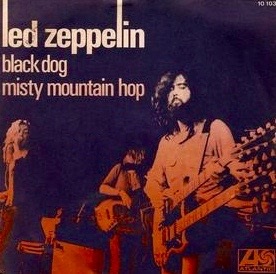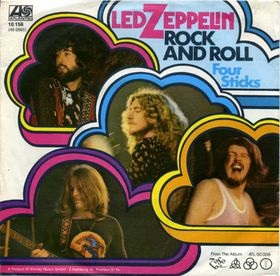The fourth studio album by Led Zeppelin never received a proper name. The eight song album commonly called Led Zeppelin IV was released November 8th, 1971 with style labels including pop/rock, blues, album rock, arena rock, blues-rock, British blues, British metal, hard rock, heavy metal and regional blues. The core band for the album, as one would expect, included singer and harmonica player Robert Plant, electric guitar, acoustic guitar and mandolin player Jimmy Page, drummer John Bonham and bass, electric piano, mandolin, recorder and synthesizer player John Paul Jones.

Black Dog is named for a Labrador retriever that wandered the grounds where the song was recorded, per Songfacts as referenced here. The opening idea for the song came from John Paul Jones having “wanted to try “electric blues with a rolling bass part,” and “a riff that would be like a linear journey.”” The 1968 Muddy Waters album Electric Mud proved an inspiration for Black Dog, which charted as high as fifteenth in the United States.

Ian Stewart contributed piano playing to Rock and Roll, the second song on Led Zeppelin IV. Having charted as high as forty-seventh in the United States, the drum work for this reportedly was inspired by the Little Richard song Keep a Knockin’. John Bonham had become frustrated with “a pretty much unplayable drum pattern” for the recording of Four Sticks, per this background. The inspiration from Keep a Knockin’ became part of the signature sound for Rock and Roll, whose lyrics were written by Robert Plant.

Sandy Denny contributed duet vocals on The Battle of Evermore, the third song on the Led Zeppelin IV album. Robert Plant wrote the song’s lyrics, per information found here, “after reading a book on Scottish history. The lyrics are about the everlasting battle between night and day, which can also be interpreted as the battle between good and evil.”
Per this feedback from Songfacts, “[t]he most famous rock song of all time, “Stairway To Heaven” wasn’t a chart hit because it was never released as a single to the general public. Radio stations received promotional singles which quickly became collector’s items.” To the best of my reckoning, the lyrics themselves are rather opaque. Two message are clear. The first is that material wealth makes getting to heaven challenging. The second message is that a wealthy woman got everything she wanted without giving anything back.
Misty Mountain Hop references the Misty Mountains that reportedly exist in Wales. The location itself is referenced in The Return of the King, the third book in The Lord of the Rings series of books by J.R.R. Tolkien; Robert Plant is reportedly a fan of the books. As mentioned here, the song itself “is about a “love-in” near London that was broken up by the police.” Jimmy Page wrote the song.
Four Sticks reportedly “was named because drummer John Bonham played it with four drumsticks – two in each hand.” Bonham reportedly had difficulty physically playing this song. The song “contains elements of Indian music.”
Jimmy Page and Robert Plant wrote Going to California, reportedly “drawing inspiration from Joni Mitchell, specifically her song “California.” In the Led Zeppelin song, “the guy in the song is looking for a girl just like [Mitchell], one with “love in her eyes and flowers in her hair” who “plays guitar and cries and sings.”
Based on a 1927 Memphis Minnie song about The Great Mississippi Flood of 1927 in Mound Landing, Mississippi, the Led Zeppelin song When the Levee Breaks offers a distinctively different sound to Memphis Minnie‘s When the Levee Breaks. As reported here, the Led Zeppelin song was “[h]eavily produced in the studio.” “All this studio wizardry made the song very difficult to perform live, which Led Zeppelin did only twice: once in a “warm up” gig in Denmark before their 1975 US tour, and again on their second night in Chicago.”
Matt – Wednesday, November 8, 2023
